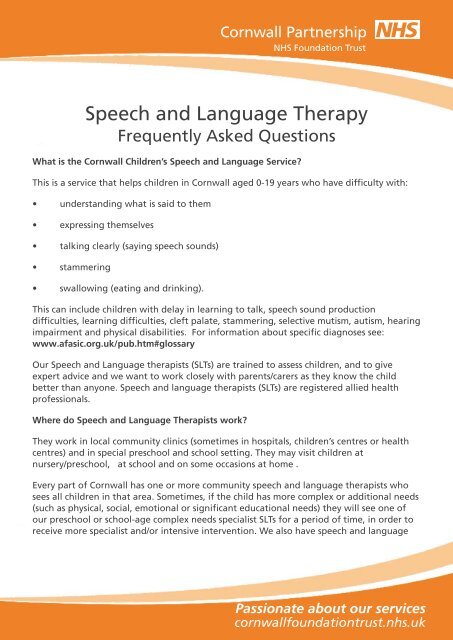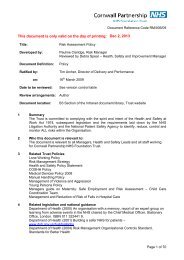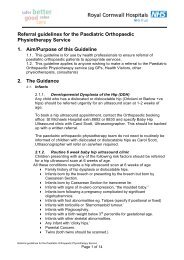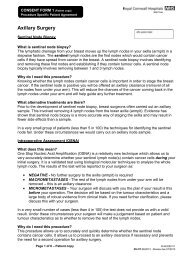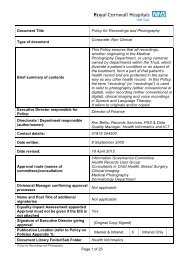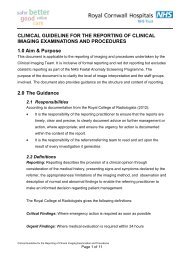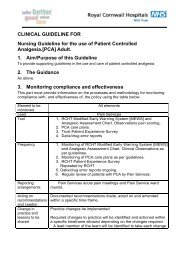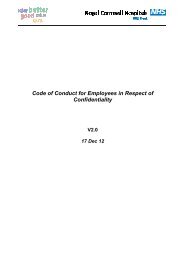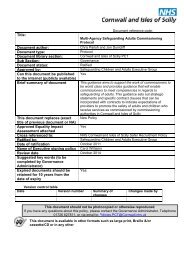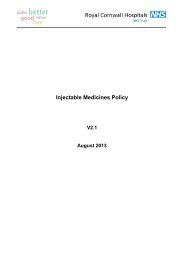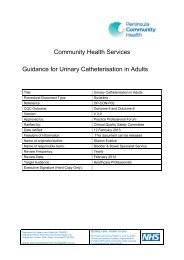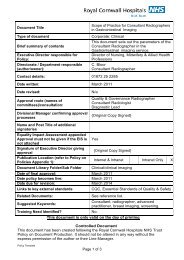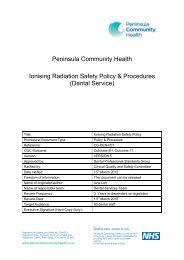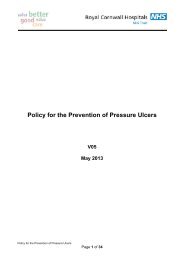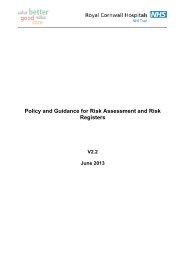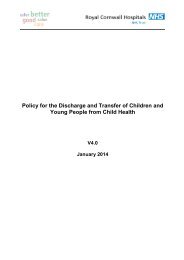Speech and Language Therapy FAQs - Cornwall Foundation Trust
Speech and Language Therapy FAQs - Cornwall Foundation Trust
Speech and Language Therapy FAQs - Cornwall Foundation Trust
Create successful ePaper yourself
Turn your PDF publications into a flip-book with our unique Google optimized e-Paper software.
What is the <strong>Cornwall</strong> Children’s <strong>Speech</strong> <strong>and</strong> <strong>Language</strong> Service?<br />
This is a service that helps children in <strong>Cornwall</strong> aged 0-19 years who have difficulty with:<br />
• underst<strong>and</strong>ing what is said to them<br />
• expressing themselves<br />
• talking clearly (saying speech sounds)<br />
• stammering<br />
<strong>Speech</strong> <strong>and</strong> <strong>Language</strong> <strong>Therapy</strong><br />
Frequently Asked Questions<br />
• swallowing (eating <strong>and</strong> drinking).<br />
This can include children with delay in learning to talk, speech sound production<br />
difficulties, learning difficulties, cleft palate, stammering, selective mutism, autism, hearing<br />
impairment <strong>and</strong> physical disabilities. For information about specific diagnoses see:<br />
www.afasic.org.uk/pub.htm#glossary<br />
Our <strong>Speech</strong> <strong>and</strong> <strong>Language</strong> therapists (SLTs) are trained to assess children, <strong>and</strong> to give<br />
expert advice <strong>and</strong> we want to work closely with parents/carers as they know the child<br />
better than anyone. <strong>Speech</strong> <strong>and</strong> language therapists (SLTs) are registered allied health<br />
professionals.<br />
Where do <strong>Speech</strong> <strong>and</strong> <strong>Language</strong> Therapists work?<br />
They work in local community clinics (sometimes in hospitals, children’s centres or health<br />
centres) <strong>and</strong> in special preschool <strong>and</strong> school setting. They may visit children at<br />
nursery/preschool, at school <strong>and</strong> on some occasions at home .<br />
Every part of <strong>Cornwall</strong> has one or more community speech <strong>and</strong> language therapists who<br />
sees all children in that area. Sometimes, if the child has more complex or additional needs<br />
(such as physical, social, emotional or significant educational needs) they will see one of<br />
our preschool or school-age complex needs specialist SLTs for a period of time, in order to<br />
receive more specialist <strong>and</strong>/or intensive intervention. We also have speech <strong>and</strong> language<br />
Passionate about our services<br />
cornwallfoundationtrust.nhs.uk
therapists in the learning disabilities team who work in special schools (link to leaflet for<br />
special schools)<br />
How do I refer a child to the <strong>Speech</strong> <strong>and</strong> <strong>Language</strong> Service?<br />
You can contact our helpline on 01208 256290<br />
or email: SLTenquiries@cornwall.nhs.uk for advice if you are not sure whether to make a<br />
referral. You can also use the websites listed below to check what communication skills to<br />
expect at what age, <strong>and</strong> how you can help. If a full referral is needed, Health visitors,<br />
preschool <strong>and</strong> school staff <strong>and</strong> other health professionals can refer a child using the form<br />
on our website as long as they get the parents signed consent. The form must be filled out<br />
fully in order to be accepted (if there is information missing, the form will be returned).<br />
What happens on the first visit?<br />
The therapist will assess the child through play if they are younger <strong>and</strong>/or carry out simple<br />
child-friendly tests. The therapist will also want to find out about the child by talking to<br />
the parents/carers <strong>and</strong> possibly other people who work with the child.<br />
What happens next?<br />
The role of the therapist is to work in partnership with parents, nursery <strong>and</strong> school staff<br />
<strong>and</strong> other professionals involved, to help children develop their communication skills to<br />
the best of their ability, <strong>and</strong> reach their potential both educationally <strong>and</strong> socially.<br />
After a first appointment the therapist will discuss the information with the parents <strong>and</strong> or<br />
any other people involved, with the parent’s permission. Possible outcomes:<br />
• the therapist may need to see your child again for more assessment or to observe<br />
them communicating in another setting such as school or preschool<br />
• a referral is needed to another specialist because the therapist needs more<br />
information such as a hearing assessment or paediatrician opinion<br />
• an appointment in a few months time to see how the child is progressing. There<br />
may be some activities for parents to carry out in the meantime.<br />
• regular speech <strong>and</strong> language therapy individually or with children with similar<br />
difficulties. This could be weekly, but may be less often.
• therapy or advice given at the child’s school, nursery or playgroup.<br />
• parent sessions where parents get the opportunity to learn about ways they can<br />
help.<br />
• the therapist may not find a problem, or may feel that the child is likely to progress<br />
spontaneously without extra help from the service.<br />
Whatever the outcome, you will receive a brief written report to summarise the<br />
results of the assessment, recommendations <strong>and</strong> any further plans.<br />
If the child does need ongoing support the SLT will develop an appropriate intervention<br />
package working closely with the child to help address their communication or feeding<br />
needs within their everyday life.<br />
What training is available for people who work with children with speech, language <strong>and</strong><br />
communication needs?<br />
There are many training packages that can be purchased by settings for their staff relating<br />
to all ages of children <strong>and</strong> for all levels of speech, language <strong>and</strong> communication needs.<br />
There are also training sessions offered within the county that places can be purchased for.<br />
For more details on any of these options please contact the central office number for SLT<br />
on 01208 256290.<br />
How do I get more <strong>Speech</strong> <strong>and</strong> <strong>Language</strong> <strong>Therapy</strong>?<br />
If settings or individuals are interested in commissioning an enhanced level of support<br />
please email your request to sltenquiries@cornwall.nhs.uk <strong>and</strong> someone from the<br />
department will contact you.<br />
Why are some children in my child's class seen more often than my child?<br />
Your SLT will decide on the best way to support your child's speech <strong>and</strong> language needs.<br />
This may involve working directly with him or her, or by working with you <strong>and</strong> other<br />
professionals to deliver any therapy or strategies. These different ways of working will<br />
mean that some children are for example seen weekly <strong>and</strong> others are seen fortnightly,<br />
monthly, half termly or even termly.
There is also a small highly specialist team of <strong>Speech</strong> <strong>and</strong> language Therapists-The<br />
Communication Support Service, who provide a high level of support for a fixed period for<br />
children with the most complex communication difficulties in a mainstream setting. They<br />
work closely with the community SLT service to make sure the right children are receiving<br />
this level of service.<br />
Useful links:<br />
There is lots of very useful information about speech <strong>and</strong> language development,<br />
difficulties <strong>and</strong> how to help on the following websites, which we highly recommend:<br />
Talking Point: www.talkingpoint.org.uk (developed for parents, <strong>and</strong> professionals –<br />
information <strong>and</strong> ideas for developmental levels <strong>and</strong> how to help).<br />
<strong>Speech</strong> <strong>Therapy</strong> Advice: www.mommyspeechtherapy.com/ (speech <strong>and</strong> language support<br />
from a parent’s perspective)<br />
Afaisic: www.afasic.org (parent support group <strong>and</strong> information)<br />
The Communication <strong>Trust</strong>: www.thecommunicationtrust.org.uk/ (advice <strong>and</strong> support)<br />
ICAN: www.ican.org.uk (charity that helps children with speech, language <strong>and</strong><br />
communication needs with good links for parents <strong>and</strong> professionals)<br />
British Stammering Association: www.stammering.org (for information <strong>and</strong> advice about<br />
stuttering)<br />
Other options:<br />
If you cannot find the information you need online, you can contact the <strong>Cornwall</strong> <strong>Speech</strong><br />
<strong>and</strong> <strong>Language</strong> <strong>Therapy</strong> Department by emailing on: SLTenquiries@cornwall.nhs.uk<br />
Or you can ring our Helpline on 01208 256290 where you can use the ‘call back’ service.


